Cardiac arrest is a serious condition that often gets confused as a heart attack or heart failure. However, cardiac arrest is different than both and it requires specific treatment methods such as using a defibrillator.
Defibrillators issue an electrical shock to the heart to try and restore the heart’s normal electrical signals. If you notice someone is in cardiac arrest, you shouldn’t hesitate to act. One of the benefits of CPR certification is that it gives you the tools to respond confidently to sudden cardiac arrest emergencies. Continue reading to learn more about what cardiac arrest does to the body and what you should do to respond to a cardiac arrest situation.
What Is Cardiac Arrest?
Cardiac arrest, sometimes called sudden cardiac arrest, is a condition in which the heart suddenly stops beating and cuts off blood flow to the brain and other organs. Sudden cardiac arrest is an emergency and it is deadly when not treated.
What Happens During Cardiac Arrest?
Electrical signals govern your heart rhythm. When these electrical signals get interrupted, the heart starts beating irregularly. Different types of arrhythmias can occur and some aren’t dangerous. One irregular heartbeat called vestibular fibrillation is the most common cause of sudden cardiac arrest.
When ventricular fibrillation occurs, the heart stops pumping oxygen-rich blood throughout the body. It can prove fatal within minutes.
Link to Heart Disease
Most people at risk of sudden cardiac arrest also have coronary heart disease. Coronary heart disease causes less blood flow to your heart and it can lead to a heart attack that damages your heart’s electrical system.
What Else Causes Cardiac Arrest?
Cardiac arrest occurs for other reasons, including the following:
- Major blood loss or lack of oxygen.
- Intense exercise, if you have heart problems
- Potassium levels that are too high, causing deadly heart rhythm issues.
- Genetic conditions may increase the tendency for arrhythmias.
- Changes to your heart’s structure. For instance, enlarged hearts or changes caused by infection can interrupt the heart’s electrical signals and contribute to sudden cardiac arrest
Is Cardiac Arrest a Heart Attack?
Your heart typically doesn’t stop during a heart attack like it does during cardiac arrest. One or more arteries get blocked during a heart attack and stop blood flow, preventing the heart from getting enough oxygen. The lack of oxygen can kill heart tissue.
However, there might be a link between heart attacks and sudden cardiac arrest. The scar tissue that grows from heart attacks can disrupt the heart’s natural signals and put you at risk for cardiac arrest. Heart attacks themselves can also trigger cardiac arrest.
Is Cardiac Arrest Heart Failure?
Cardiac arrest is an instant crisis, whereas heart failure is a gradual condition where the heart gets weaker over time until it can no longer send enough blood and oxygen throughout your body. When your cells lack these nutrients, your body starts to deteriorate. You might find it harder to catch your breath or do simple things like carrying groceries or walking up the stairs.
Who Is At-Risk for Cardiac Arrest?
Though there is no specific cause for cardiac arrest, there are a few known risk factors:
- Those with coronary artery disease.
- Men are more likely to experience cardiac arrest.
- Past arrhythmias or cardiac arrest. Family histories with arrhythmias or cardiac arrest.
- Smoking and alcohol abuse.
- Diabetes, high blood pressure, or heart failure.
- Obesity.
- One or more heart attacks.
It’s important to note that sudden intense emotions, such as out-of-control anger, can prompt arrhythmias causing cardiac arrest. Mental health conditions such as anxiety and depression can also make you more likely to suffer from sudden cardiac arrest. If you are struggling with either of these conditions, consult a doctor to see what treatment options are available.
What to Do When Someone Enters Sudden Cardiac Arrest
If someone experiences sudden cardiac arrest, you need to treat them immediately with a defibrillator. A defibrillator is a machine that delivers a shock to your heart in an attempt to restore a normal heartbeat. The shock must be delivered within minutes to help. First responders such as police officers, firefighters, and paramedics typically have a defibrillator and understand how to use it. Many public places also have an automated external defibrillator on-premise that everyone can use.
How to Use an AED
You don’t need training to use an AED. The device will issue directions and it senses the arrhythmia so it can produce the correct shock to the heart. If you think someone is in cardiac arrest, you should contact medical authorities immediately and perform CPR until they arrive.
What Should You Do After Suffering from Cardiac Arrest?
After you recover from a cardiac arrest, you should see a cardiologist to check your electrical system and devise a treatment plan. Doing so will help prevent another cardiac arrest episode. You might also need blood tests to check your heart.
What Other Tests Should You Get?
- EKG
- Echocardiography
- Cardiac MRI
- MUGA
What Is an ICD?
If you suffer from cardiac arrest, you might also receive an ICD, a small automated defibrillator
That implants under your skin and sends an electrical shock if it detects irregular heartbeats. Your doctor will recommend it If you have severe heart disease or have already suffered from cardiac arrest.
How Can You Prevent Sudden Cardiac Arrest?
Diet: Make sure you get plenty of vegetables and limit your unhealthy fats such as saturated fat and trans fat.
Watch Your Weight- Obesity can contribute to cardiac arrest.
Stress management- Learning stress reduction techniques and exercising more frequently can reduce your risk of sudden cardiac rest.
Quit Smoking- Smoking is a known cause of heart disease and it leads to sudden cardiac arrest quite often.
Conclusion- What Happens to the Body During Cardiac Arrest?
Cardiac arrest occurs when the heart’s electrical rhythms get interrupted and the heart stops pumping oxygen-rich blood to the rest of the body. It can be fatal within minutes and requires the aid of a defibrillator and medical treatment.
However, bystanders can do their part, as well. If you witness a sudden cardiac arrest, you can perform CPR. If you are with someone else, you can direct them to look for an AED while performing CPR. To perform CPR correctly, you should consider getting your online CPR certification. You can visit an online CPR certification provider to earn your CPR certification at your own pace.


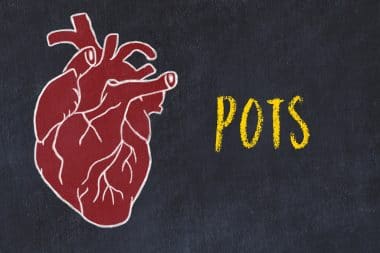
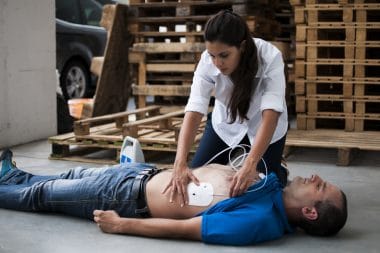
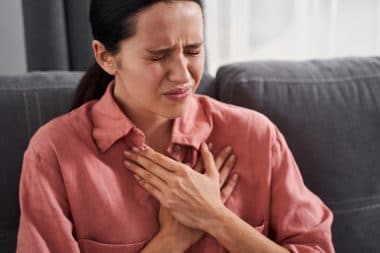
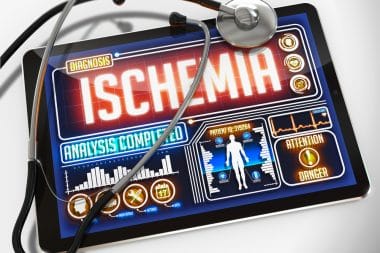
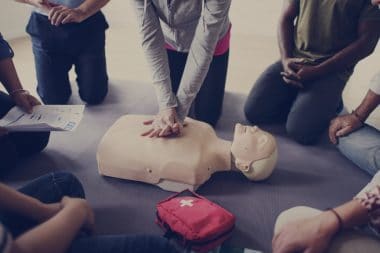
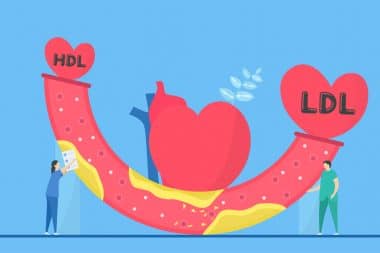
Reply